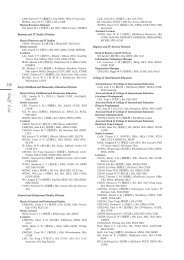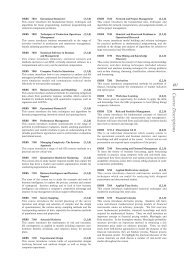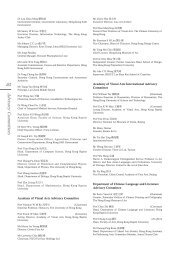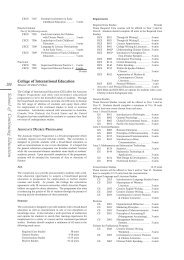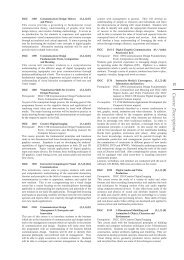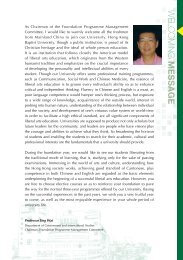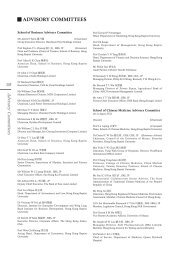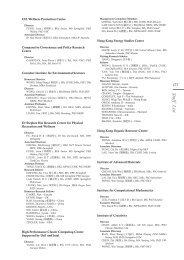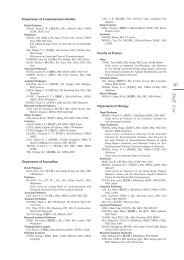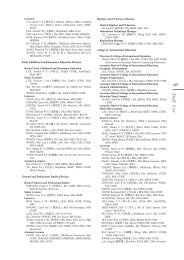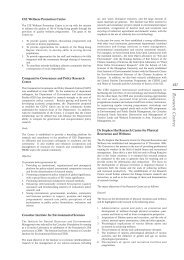Course Descriptions - Hong Kong Baptist University - Academic ...
Course Descriptions - Hong Kong Baptist University - Academic ...
Course Descriptions - Hong Kong Baptist University - Academic ...
- No tags were found...
Create successful ePaper yourself
Turn your PDF publications into a flip-book with our unique Google optimized e-Paper software.
336<strong>Course</strong> <strong>Descriptions</strong>year in German-speaking Europe or equivalent orAbility to use German for <strong>Academic</strong> Purposes inspeech, reading and writingThis course examines the economies of the German-speakingarea of Europe from 1945 to the present, with an emphasis on theGerman “Social Market Economy”. Where appropriate, it takesstudents’ working experience in Year III internships into account.Based on earlier traditions, the Federal Republic of Germanypurposely developed a specific political and economic system, the“Social Market Economy”. It created an extensive welfare state,but also institutions, which emphasized non-confrontational,cooperative action of employers and employees within a freemarket. Austria and Switzerland pursued similar strategies. Theseneo-corporatist structures underpinned the post-war “economicmiracles” and decisively shaped contemporary culture.In recent years, however, SMEs face serious challenges. Socialservices expansion outpaced economic growth. The systemsbecame too costly and are further affected by demographic trends,structural change in the industry and attendant unemployment,European integration and the globalization of trade and capitalmarkets. Germany has also had to cope with the unforeseen costof reunification. As a consequence, the SMEs are undergoinglengthy and painful reforms. New industrial, labour, fiscal andeducational policies are pursued to sustain the development ofglobally competitive, “post-industrial” service economies, whileat the same time trying to retain as much as possible the originalconsensus models.This course is held entirely in German.EURO 4898-9 Honours Project (European Studies) (6,*,*)Prerequisite: Year IV Standing in the European Studies majorThe Honours Project is an independent academic research projectabout a topic chosen and produced individually by the studentunder the supervision of a member of staff. The topic shouldfall within the general area of social sciences, with an emphasison Europe and/or the geographic areas covered in the EuropeanStudies programme.EURO 7010 European Integration and European (3,3,0)GovernanceThe course covers both European comparative politics andEuropean integration. It presents the main features of politicalinstitutions and political sociology of European countries. Itexamines the causes and historical evolution of Europeanunification and then looks analytically at the institutions andthe policies of the Union, assessing their effectiveness andinvestigating their implications for the rest of the world. It alsoprovides a critical review of the main theoretical contributions tothe debate on European integration, and explores the prospectsfor eastwards enlargement in the post-Communist period and thefuture directions that the EU may take.EURO 7020 Topics in Political Economy: Europe (3,3,0)and ChinaThis course focuses on the core approaches to comparativepolitical economy and looks comparatively at the changingrelations between (1) capital and labour, (2) states and markets,and (3) governments and the economy in Europe and Chinarespectively. It introduces students to the relationship betweenthe political and economic underpinnings of functioningmarkets, and to provide students with a general understandingof the institutions, states, and personalities that historically andcurrently have shaped the trajectories of European and Chineseeconomic reforms. This course also focuses on developments atboth the regional and the global levels which are re-shaping theEU and China, and the related diversity in economic and socialperformance respectively.EURO 7030 Europe and China in the International (3,3,0)System: Political and Economic RelationsThis course covers the historical perspectives as well as the currentstate of relationship between Europe and China, includingpolitical, economic and social-cultural dimensions. It enablesstudents to understand the Chinese perceptions of Europe and theEuropean perceptions of China. Since World War II and until theend of Cold War, Sino-European relations have undergone severalmajor changes which are functions of the changes in the strategictriangle between China, the United States and the Soviet Union.After the opening up of China and the end of the Cold War, Sino-European relations have become a strong pillar in Chinese foreignpolicy in an attempt to counterbalance the dominance of thesuperpower, the United States. This course examines the role ofEurope in Chinese foreign policy, the significance of the Europeaneconomy for the Chinese modernization, and the uniqueness ofChina in the foreign policies of the EU and European countries.EURO 7040 European and Chinese Legal Issues (3,3,0)One often hear that one of the most important obstacle whenmaking business with China’s “socialist market economy” isa widespread misconception of law to the benefit of informalrelations (so called guanxi) including illegal practices, a disorderlegal system and a general lack of the rule of law. Withoutmentioning that most of Chinese trade-related laws are stillincompatible with WTO rules. Conversely, Chinese partners withEurope usually consider that laws and regulations are there toonumerous, extremely binding, complicated (the key principle isthat a national court or tribunal must interpret domestic law inaccordance with European law) and remain protectionists.Chinese and European legal institutions appear to be so disparatethat comparing them may seem really innovative but actually, it istruly impossible to engage in Euro-China relations without havinga grasp of fundamental and up-to-date knowledge of legal issuesof both sides.EURO 7050 Methodology for Political Research (0,2,0)The course aims at teaching students to formalize theirindependent study project. It introduces to the different techniquesavailable for field-work in political science, to the differentapproaches in comparative politics and international relations,and to think critically about the relation between fact-findingand theory building, between data collection and interpretation.Students are expected to present a written proposal for theirDissertation or Project at the end of the class.EURO 7060 Politics and Public Policy in China/ (3,3,0)<strong>Hong</strong> <strong>Kong</strong>Throughout the course we will be focusing on questions such as:In what ways have post-Mao reforms reshaped political rhetoricand rules of game in China? What can we learn about policymaking and policy implementation by studying China as a case?In what ways globalization may affect governance in China?What are the consequences of <strong>Hong</strong> <strong>Kong</strong>’s unique politicalsituation? To what extent is policy in the SAR determined by (1)the weight of the past and (2) factors at the national level? Wheredoes the real power in <strong>Hong</strong> <strong>Kong</strong> lie?EURO 7070 Politics of Industrial Relations and (3,3,0)Welfare Systems in Europe and ChinaIndustrial relations are a central part of political economy in bothEurope and China. Europe is the birthplace of the industrialrevolution, modern labour movements, and the welfare state, whileChina is undergoing a fundamental socioeconomic transformationthat restructures its industrial relations and welfare regime. Thiscourse examines how politics, ideology, and institutions shapeindustrial relations and welfare systems in both Europe and Chinaand explores theoretical and conceptual issues such as statelabourrelations, class formation, citizenship, social rights, interestrepresentation and intermediation, etc., in two different social andpolitical contexts.EURO 7080 East-Central Europe and EU (3,3,0)EnlargementWith the accession of ten new member states in mid-2004,the European Union embraces 25 countries, and its area ofcompetence has widened to include monetary policy, security,as well as justice and home affairs. For the EU and the member



